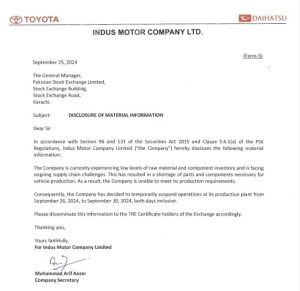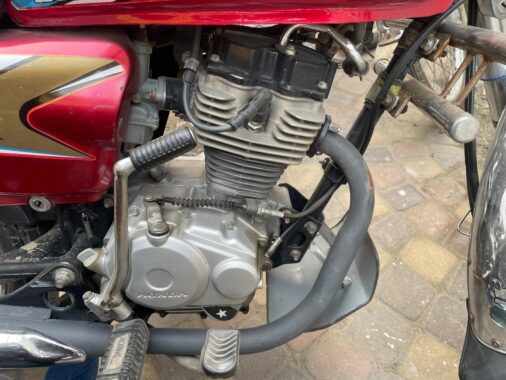It’s been a month or a two, Toyota Pakistan is consistently facing supply chain and short inventory issues. In a recent update, Toyota Indus Motor Company Limited (IMC), a leading automotive manufacturer in Pakistan, has announced a temporary suspension of operations at its production plant from September 26 to 30, 2024.
The decision comes in response to ongoing supply chain challenges and a shortage of essential raw materials and components.

In a disclosure to the Pakistan Stock Exchange, TIMC stated that low inventory levels of raw materials and components have hindered its ability to meet production requirements. The company has been grappling with supply chain disruptions, leading to a shortage of parts and components necessary for vehicle manufacturing.
Last month, Toyota Pakistan announced two production cuts commencing from July 5, 2024, to July 22, 2024, and August 6, 2024, to August 8, 2024 (both days inclusive), later.
Implications for the Automotive Market
The suspension of operations is expected to have a temporary impact on the company’s production output and potentially affect vehicle deliveries. However, Indus motors has assured customers that it is working diligently to minimize any disruptions and resume normal operations as soon as possible.
This announcement comes at a time when the Pakistani automotive industry is already facing challenges due to economic factors and global supply chain disruptions. The suspension of operations by TIMC further highlights the difficulties faced by local manufacturers in maintaining production amidst these challenging conditions.
Earlier, Toyota Indus announced that it has officially commenced its export operations, targeting Oceanian countries. This marks the realization of a plan in the works since last year. The initial export lineup includes the popular domestic models Fortuner, Hilux, and various Corolla Cross variants.
Indus Motors CEO, Asghar Jamali, expressed the significance of this milestone, declaring it a pivotal moment for both the company and Pakistan. The move is directly aligned with the government’s AIDEP 21-26 policy which prioritizes local component manufacturing, stringent safety standards, and global market penetration for Pakistani-made vehicles.
What do you think about the fresh move by IMC? Drop your thoughts in the comments section.






